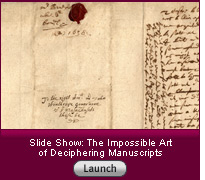
Robert Frost has been having a hard winter. First the remote Vermont farmhouse where he summered from 1939 to 1963 was vandalized by partying teenagers.* Windows were smashed, dishes broken, a chair split up for firewood, precious artwork and antiques splattered with beer and bodily fluids. Then last month, charges were raised against a scholarly edition of Frost's private notebooks. The work, first published in early 2007, had been heralded as offering a rare glimpse into the reclusive poet's creative process. But now the notebook transcriptions appear to be riddled with errors that made Frost look like "a dyslexic and deranged speller," who often "made no sense," according to poet William Logan, a professor at the University of Florida who compared sections of the published version with manuscript originals from the archives at Dartmouth College.
Where was the greatest damage done? In the minds of documentary editors—the people who prepare historical and literary documents for the press, not documentary film editors—probably on the page, not in the summer cottage. Current editorial standards require print versions of authors' journals to reproduce as faithfully as possible every stroke of the pen, every cross-out or insertion, even sometimes the look of the handwritten page, with ragged margins and random gaps. For dead writers, diary pages are the best evidence scholars have of the ways their minds worked—their first thoughts on a poem or story, their innermost ambitions and fears as human beings. No one wants to get that wrong.
The five years that Claremont-McKenna literature professor Robert Faggen spent transcribing, editing, and proofreading Frost's 48 notebooks for publication by Harvard University Press may seem like a long time. But it pales in comparison with the number of years many scholars—and teams of scholars—have devoted to making sense of the hard-to-decipher handwriting of authors from Thoreau to Henry James to the less-well-known but no less prolific 19th-century American diarist Caroline Healey Dall. The mistakes that have come to light in The Notebooks of Robert Frost speak to the challenges that all such toilers after the truth encounter in learning to read and represent in print a difficult or archaic "hand." And Frost's, cramped and crabbed like the man himself, is certainly one of them.
"Human beings were not meant to be consistent," explains Elizabeth Witherell, director of the Thoreau Edition—an enterprise begun at Princeton in 1966, three years after Robert Frost's death, and now based at the University of California at Santa Barbara. She might have been summing up the spiritual philosophy of Henry David Thoreau, the iconoclastic writer and naturalist, as notorious in documentary editing circles for his terrible handwriting as for the night he spent in jail after refusing to pay taxes in an anti-slavery protest. But no, it is the mistake-prone editor she speaks of: "Every time we force ourselves into consistency, we fail." Accurately rendering authors' jottings, often intended only as notes to self, into regular type verges on the impossible.
The solution is "many eyes." To catch inevitable errors, documentary editors arrange to have as many fresh readings of their transcriptions against the original documents as possible, a process that no doubt would have alarmed the very writers who hastily scribbled their private musings into so many cheap notebooks in the first place. Editors, who sometimes employ graduate students to help with the laborious task, train themselves and their assistants in the idiosyncrasies of a writer's hand, his common phrasings, and the "gestalt" of the era—likely references to people and places, world events and literary allusions, that must be annotated for today's readers.
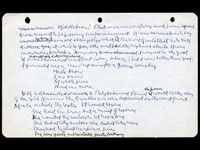
One such reference seems to have tripped up Robert Faggen. A passage in which Frost alluded to fifth-century Mediterranean voyager Hanno the Carthaginian came out as "Hannof the Carlingian." Context is all. That same sentence mentioned the "coast of West Africa." Carthage, at least, should have popped to mind. In another passage, in which Frost compared a poet's early drafts to a baseball player's trial swings before stepping up to the plate, Faggen offered the phrase "picktie exhibition." Yes, "public" was hard to read—but even a "pickle" exhibition would have made more sense. When you're reduced to "counting humps," as documentary editors refer to those moments of despair when they find themselves decoding words letter by letter, you know you're in trouble. And, as always, the more complete read-throughs, the better. Faggen actually corrected himself on Hanno farther down on the same page, and got the annotation right. But the first mistaken reference remained for critics to pounce on.
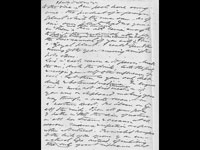
Elizabeth Witherell describes the process of reading Thoreau's journals for the press as "like driving over a deeply potholed road—you read along and when you come to a word you can't understand you back up and run at it again with the force of what you do understand as momentum." Drawing on her knowledge of Thoreau's usual subjects and vocabulary, the context of the passage, and the range of word choices in mid-19th-century American English, Witherell finds the passage eventually "resolves into something recognizable." Although graduate students trained by editors like Witherell to help in the process are increasingly unfamiliar with 19th-century script–or even any script at all in the keyboard age–Internet expertise can be a help. Googling "Hanno the Carthaginian" nets pages of hits; "Hannof the Carlingian," none.
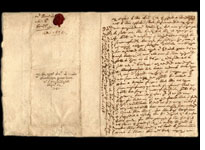
These days, university presses can no longer afford to employ the roomful of proofreaders that, at Princeton anyway, examined the earliest volumes put out by the Thoreau Edition. Now it's all up to the project editors. The Massachusetts Historical Society, which houses the long-running Adams Papers project—devoted to the publication of every extant letter by Presidents John Adams and John Quincy Adams and most of their family members—is one of the few organizations that still does transcribing, editing, proofreading, and formatting for many of its editions all under one roof. MHS archivists still recall the struggle to decipher the handwriting of Massachusetts Bay Colony's founding Gov. John Winthrop for the Society's edition of The Winthrop Papers. Plenty of guesswork was involved, and some go so far as to suggest that if Winthrop's famous "we shall be as a city upon a hill" sermon had been recorded in his own inscrutable hand, rather than that of an unknown 17th-century copyist, politicians today would be lacking some key material for speechifying.
Yet the rewards of the task can be great for a determined researcher. Dean Grodzins, biographer of radical abolitionist minister Theodore Parker, first read a Parker letter as an undergraduate at Williams College in 1982, and he was hooked. The letter, which by a fluke wound up in the college archives, told of Parker's protest against the Fugitive Slave Law—which landed him in jail—but contained so many references to obscure figures of the time that Grodzins was still unraveling the connections nearly 20 years and countless manuscript boxes and microfilm reels later as he prepared American Heretic: Theodore Parker and Transcendentalism for publication. By then, Grodzins was so familiar with Parker's handwriting—often just a shorthand—and his characteristic speech patterns that he could tell when Parker wrote "m. c. h. & s." in his sermon notes he meant "mind, conscience, heart and soul."
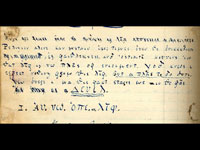
Parker, too, had famously bad handwriting. William Lloyd Garrison, hard-line abolitionist and editor of the Liberator, once complained that an essay Parker submitted was so unreadable it would require a dozen assistants to interpret his clotted sentences for the printer "without any serious blunders." Grodzins, nevertheless, found ways to decipher Parker's private journals, even one stunning passage written in code. Grodzins sensed Parker was unhappily married, but he had little direct evidence. Parker's wife, Lydia, often read through her husband's journals when he was out of the house, so the preacher couldn't bare his soul there. Parker sometimes wrote in Greek or Latin, however, languages Lydia didn't know. One such passage, Grodzins divined from its uncharacteristic word spacings, was actually English written with Greek characters. Putting together crossed out words and the Greek alphabet spellings, Grodzins found that Parker had written: "My wife is a DEVIL. I. HAVE. NO. HOPE. in. LIFE."
Most editors of scholarly editions have stories to tell about the one word that stumped them. For decades, the founding editor of the Thoreau Edition, Walter Harding, believed Thoreau had written the word Ecology in a letter of the 1850s, trumping the first known use of the term by eight years. The OED had even changed its entry to include Thoreau's usage on Harding's say-so. But when a botanist pressed him on the claim, Harding searched further and realized that what he'd taken for a capital E was really a G. Geology was the word Thoreau had written.
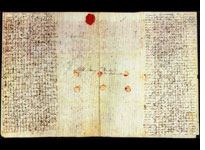
The 19th-century practice of cross-writing has left many scholars scratching their heads. Trying to fit as many words as possible onto a single sheet of paper, letter-writers filled a page, then turned it 90 degrees and wrote perpendicularly back across their own handwriting. Even with the most regular hand, confusion is inevitable. Elizabeth Peabody, the Transcendentalist philosopher and matchmaker for her two younger sisters, who married Horace Mann and Nathaniel Hawthorne, wrote about her realization that she was not in love with Horace Mann in a cross-written letter to her sister Mary—who was. Elizabeth explained her feelings for the 36-year-old, recently widowed politician, whose hair was said to have turned white in a matter of weeks as he mourned his young first wife: "his situation, his grey hair—his sorrow have ever precluded from my imagination" the possibility that she would fall in love. For Elizabeth Peabody, it was sour grapes—she'd been rebuffed. But for scholars, the question was, did Peabody write "grey hair," "grief, loss," or "grave air"?
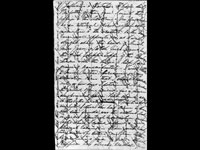
Pierre Walker and Greg Zacharias, editors of the new edition of Henry James' complete correspondence, puzzled over a word in a cross-written letter James sent to his intimate friend Grace Norton. Was James signing himself "unutterably yours" or "unalterably yours"? The problem was exacerbated by the editors' awareness that James' lowercase u's and a's often looked identical. And the master was sloppy in crossing his t's, turning back to the task only after coming to the end of a line. Ultimately, Walker and Zacharias settled on unutterably, after making a systematic search of all James' letters to Norton and finding a handful of unutterablys sprinkled through, but no unalterablys.
While the difference between unutterably and unalterably may not seem momentous, Walker and Zacharias' edition is an attempt to rectify Faggen-like errors in earlier volumes assembled by Leon Edel, James' biographer—who had the writer crossing the nonexistent "Italvia Pass" between Switzerland and Italy, rather than the Stelvio Pass, in March of 1869. And, to the documentary editor, no quirk of spelling, punctuation, or capitalization is insignificant. "These things aren't minor," says Helen Deese, who spent 20 years editing the diaries of 19th-century women's rights activist Caroline Healey Dall for the MHS' edition, expected to run to four volumes. "They are your stock in trade; you're there to get them right."
Robert Frost observed, in an early notebook transcribed in Faggen's edition, that men are ruled by four fears: "of jail, of the poor house of the insane asylum and of Hell." He might also have added a fifth—the fear of being censured by colleagues for easily avoidable errors in a scholarly edition. Certainly this fear focuses the mind of every scholar devoted to accuracy. Yet would Frost himself really have cared about the mistakes? In his poem "A Passing Glimpse," Frost writes of the ephemeral nature of perception, of beauty itself—themes that are ever-present in his fragmentary, Orphic notebook entries as reproduced by Faggen. A sideways glance yields more than a trained, fixed gaze. The crusty New England bard may be having the last laugh:
Was something brushed across my mind
That no one on earth will ever find?Heaven gives its glimpses only to those
Not in a position to look too close.



No comments:
Post a Comment